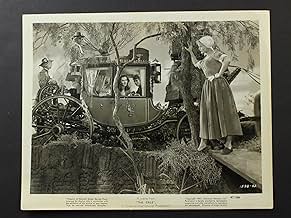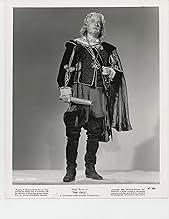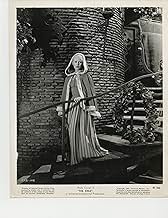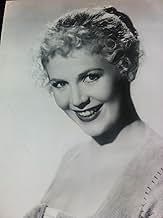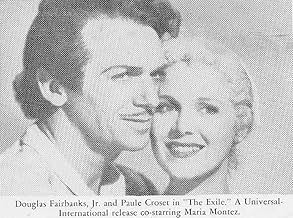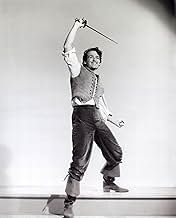NOTE IMDb
6,6/10
589
MA NOTE
Charles II, roi d'Angleterre, se trouve en exil en Hollande où il tombe amoureux d'une belle fermière.Charles II, roi d'Angleterre, se trouve en exil en Hollande où il tombe amoureux d'une belle fermière.Charles II, roi d'Angleterre, se trouve en exil en Hollande où il tombe amoureux d'une belle fermière.
- Réalisation
- Scénario
- Casting principal
Paula Corday
- Katie
- (as Paule Croset)
Milton Owen
- Wilcox
- (as Milton A. Owen)
Ben Wright
- Milbanke
- (as Ben H. Wright)
Ramsay Hill
- Cavalier Officer
- (as C.S. Ramsey-Hill)
Gordon B. Clarke
- Cavalier Guard
- (as Gordon Clark)
Avis à la une
The costuming for this film must bring a smile to the face of anyone familiar with fashions of the 17th century. The film's action occurs in 1660, but Fairbanks and his colleagues wear jerkins fitted to the waist, stylish about 1620-1630, but apparently considered more dashing than the loose smocks and petticoat breeches of 1660. Then Maria Montez arrives, wearing a gown clearly from the 1880 Wild West costume rack in the Wardrobe Department. To atone, her second frock is only a century out of kilter, something from about 1750.
I found the sound-stage exteriors very claustrophobic and phony, and I noted only 3 instances when I felt the "Ophüls touch," for example when the shutter blew open and closed, alternately revealing and concealing the lovers as they approach their first kiss. I'm also puzzled why Max Ophüls is listed as "Opuls" in the credits, but perhaps that is a phonetic rendering to eliminate the umlaut?
I found the sound-stage exteriors very claustrophobic and phony, and I noted only 3 instances when I felt the "Ophüls touch," for example when the shutter blew open and closed, alternately revealing and concealing the lovers as they approach their first kiss. I'm also puzzled why Max Ophüls is listed as "Opuls" in the credits, but perhaps that is a phonetic rendering to eliminate the umlaut?
When Douglas Fairbanks, Jr. started his career in silent screen he did not go for the swashbuckling roles that his famous father did. My guess is he wanted to be judged on his own as a player. In fact it was his mother who when Fairbanks, Sr. was slow with the child support who got him into film in the first place, hoping to capitalize on the name. Later as he got older and was established in his own right, Fairbanks made claim to the legacy of his father in such films as The Exile.
In fact Fairbanks both wrote the screenplay and produced this film and got European director Max Ophuls for the piloting. He plays a most famous exile, Charles Stuart, Charles II of Great Britain who is exiled in the Netherlands and poised to reclaim his own in 1660.
The story is based on a historical novel by British writer Cosmo Hamilton and it tells of that brief interregnum in British history between the sudden death of Oliver Cromwell and the restoration of Charles II. Charles Stuart had narrowly escaped from his country after the Puritan takeover and was living in exile in somewhat humble circumstances wherever in Europe he could find shelter. In 1660 it was the Netherlands.
Historians have debated long about the collapse of the military dictatorship of Lord Protector Oliver Cromwell. He had things pretty much his own way and when he died his son Richard wasn't up to the job he inherited. It was a close run thing that the United Kingdom did not break apart into civil war again at this time.
By 1660 just about everybody except the most committed of Puritans felt that only a Stuart Restoration would keep the country united. But some of those most committed Puritans had a big vested interest in seeing that the Restoration did not occur. Therein lies the tale of this film.
Douglas Fairbanks, Jr. is a perfect Charles Stuart, in fact he looks quite a bit like him. As in real life sharing his exile is Lord Clarendon who is played here by Nigel Bruce. When Charles reclaimed his throne, Lord Clarendon became his first minister. In the film as in life Clarendon was constantly reminding him of his duty and not to spend all his time on frivolity and chasing skirts. In real life after the action of this film, Charles got rid of Clarendon, but with a decent pension for loyalty and services rendered.
As petitions come from various folks over in Great Britain to resume the monarchy, Charles plays coy all the time dodging Puritan agents. Several have come to the town where he's staying and Charles has a bit of sport with them by just pretending he's a penniless exile. He even takes a job as a laborer on Paula Corday's farm. He even falls for her as he did with MANY women.
But a most cunning and ruthless Puritan in the person of Henry Daniell arrives to take over the hunt and kill the king before he can set sail back to his realm. This is one of Daniell's finest performances on screen, you can believe he's one cold and merciless killer and a true believer in the Puritan Revolution. Fairbanks and Daniell have a duel in a Dutch mill that's the equal of the one Errol Flynn and Basil Rathbone had in Robin Hood.
As per her contract Maria Montez got top billing as a French countess who finds Charles Stuart as a farm hand and delivers a message of support from his cousin Louis XIV of France. Robert Coote has a very funny part as an unemployed actor who is passing himself off as Charles Stuart and who the Puritans nearly kill for such a good performance. Fairbanks uses Coote to his own end to further his deception, but steps in when Daniell's about to run him through.
The Exile is one of Douglas Fairbanks, Jr.'s finest films and he really does the part in a way that would have made Dad proud.
In fact Fairbanks both wrote the screenplay and produced this film and got European director Max Ophuls for the piloting. He plays a most famous exile, Charles Stuart, Charles II of Great Britain who is exiled in the Netherlands and poised to reclaim his own in 1660.
The story is based on a historical novel by British writer Cosmo Hamilton and it tells of that brief interregnum in British history between the sudden death of Oliver Cromwell and the restoration of Charles II. Charles Stuart had narrowly escaped from his country after the Puritan takeover and was living in exile in somewhat humble circumstances wherever in Europe he could find shelter. In 1660 it was the Netherlands.
Historians have debated long about the collapse of the military dictatorship of Lord Protector Oliver Cromwell. He had things pretty much his own way and when he died his son Richard wasn't up to the job he inherited. It was a close run thing that the United Kingdom did not break apart into civil war again at this time.
By 1660 just about everybody except the most committed of Puritans felt that only a Stuart Restoration would keep the country united. But some of those most committed Puritans had a big vested interest in seeing that the Restoration did not occur. Therein lies the tale of this film.
Douglas Fairbanks, Jr. is a perfect Charles Stuart, in fact he looks quite a bit like him. As in real life sharing his exile is Lord Clarendon who is played here by Nigel Bruce. When Charles reclaimed his throne, Lord Clarendon became his first minister. In the film as in life Clarendon was constantly reminding him of his duty and not to spend all his time on frivolity and chasing skirts. In real life after the action of this film, Charles got rid of Clarendon, but with a decent pension for loyalty and services rendered.
As petitions come from various folks over in Great Britain to resume the monarchy, Charles plays coy all the time dodging Puritan agents. Several have come to the town where he's staying and Charles has a bit of sport with them by just pretending he's a penniless exile. He even takes a job as a laborer on Paula Corday's farm. He even falls for her as he did with MANY women.
But a most cunning and ruthless Puritan in the person of Henry Daniell arrives to take over the hunt and kill the king before he can set sail back to his realm. This is one of Daniell's finest performances on screen, you can believe he's one cold and merciless killer and a true believer in the Puritan Revolution. Fairbanks and Daniell have a duel in a Dutch mill that's the equal of the one Errol Flynn and Basil Rathbone had in Robin Hood.
As per her contract Maria Montez got top billing as a French countess who finds Charles Stuart as a farm hand and delivers a message of support from his cousin Louis XIV of France. Robert Coote has a very funny part as an unemployed actor who is passing himself off as Charles Stuart and who the Puritans nearly kill for such a good performance. Fairbanks uses Coote to his own end to further his deception, but steps in when Daniell's about to run him through.
The Exile is one of Douglas Fairbanks, Jr.'s finest films and he really does the part in a way that would have made Dad proud.
Max Opuls does a good job of directing, Douglas Fairbanks Jr is fun to watch, and Henry Daniell is absolutely superb as the ruthless villain, but the ending is much too serious and monarchic, especially in view of the fact that Charles II was ready to help out in the kitchen and be a farmhand. I could see this film being made prior to WWII with all the bowing to the British crown and empire, but by 1947 it seems out of sync with its time.
Wonderful photography, great duel between DF Jr and Daniell. Some clever dialogue, especially from DF Jr.
Above average, worth watching despite the drawbacks pointed out above which, of course, might even be positives from the standpoint of someone of more aristocratic leanings.
Wonderful photography, great duel between DF Jr and Daniell. Some clever dialogue, especially from DF Jr.
Above average, worth watching despite the drawbacks pointed out above which, of course, might even be positives from the standpoint of someone of more aristocratic leanings.
I remember seeing the preview of THE EXILE when I was 9 years old, but never actually saw the film till last night. Reminded of this rare and all-but-forgotten picture via this website, I sought it out on the internet and purchased it for a modest price. No disappointment. A romantic adventure film set in 1660 combines real history with highly entertaining story. Douglas Fairbanks Jr. was a great leading man and he plays this role with ease and vigor. The re-creation of the era was perfect and the film has not a trace of today's annoying Attention Deficit Disorder editing. They didn't make any good movies in 2005, as evidenced by the trashy 5 lefty-spin pictures nominated as Best Picture. If you want to see a classic, don't give up on it. Seek it out and with tenacity you can find it and see it. I've only failed once, but still looking for that rarity.
In one of his BEST acting roles, Douglas Fairbanks, Jr.'s second stint as a movie producer--and his first as a writer--is an ambitious attempt to dramatize the tale of the restoration of Charles II to the throne of England. An avowed Anglophile, Fairbanks has a strong sense of the history of his adoptive land. (He was born in New York City.) Fortunately, the drama and excitement of the pursuit of Charles Stuart (Fairbanks) after his return from self-imposed exile in Holland by Oliver Cromwell's Puritans is lushly displayed by the producer-author-star's insistence on a deliberate, poetic pace for the story. Much of the film is concerned with Fairbanks' trysting with the luscious Croset--later Paula Corday--in her first starring role, as a Royalist who conceals the fugitive king on her estate. Despite a strong supporting cast and an interesting concept, the film is a forgotten charmer!
Le saviez-vous
- AnecdotesBecause of contractual requirements, Maria Montez receives star billing even though her role only demands she be on screen for about ten minutes, 40 minutes into the film, after which she is never seen again. Although the film was not produced by Universal, it was released by that studio and concluded Montez's contract with the studio.
- Versions alternativesDirector Max Ophuls's original ending was changed prior to the American release. In the original ending, there is an unbroken shot that starts with Nigel Bruce's character waiting outside the door and goes on to follow Douglas Fairbanks Jr. (in his regal garb) as he descends the stairs and walks out into the crowd. Katie (Rita Corday) prays and leaves her room. Two men enter the now-empty inn and discuss the placement of a commemorative plaque for the site. As they go over the wording for the plaque (about Charles II's loyal supporters, etc.), they notice Katie exiting in the background and dismiss her as unimportant. As they continue reading, the screen dissolves to a shot of the plaque (seen earlier in the film), closing in on the engraved image of Charles II's head in profile at the bottom. (In the American release ending, a quick shot of Katie leaving her room breaks up the shot of Fairbanks descending the stairs. After the king exits, the film cuts to the plaque and the engraved image.) The original ending may have been seen on international prints of the film. Turner Classic Movies has, on occasion, shown the alternate ending as a bonus after airing the American version of the film.
- ConnexionsReferenced in The Flop House: The Flop House: Episode 98 - In Time (2012)
Meilleurs choix
Connectez-vous pour évaluer et suivre la liste de favoris afin de recevoir des recommandations personnalisées
- How long is The Exile?Alimenté par Alexa
Détails
- Durée1 heure 35 minutes
- Rapport de forme
- 1.37 : 1
Contribuer à cette page
Suggérer une modification ou ajouter du contenu manquant


